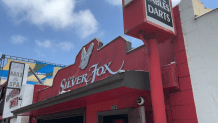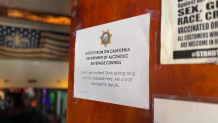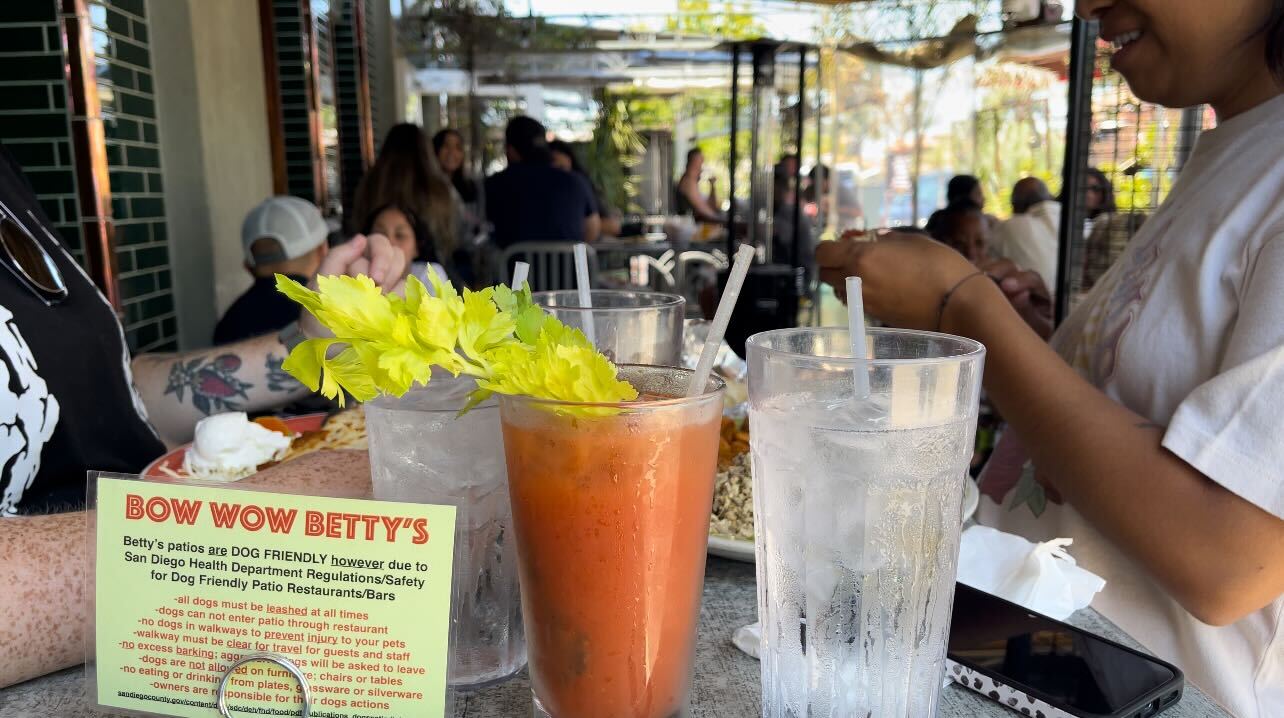WARNING: This story may have disturbing details. Discretion is advised.
Drug testing devices are now available at certain bars and nightclubs across San Diego County as part of a new state law aimed at preventing people from being unknowingly drugged.
Starting Monday, the nearly 200 establishments in the county with a Type 48 license will be expected to have kits that can test for the presence of "date-rape drugs" or "roofies" — substances commonly used to spike or lace drinks, often as a way to take advantage of someone or commit sexual assault.
The California Department of Alcoholic Beverage Control (ABC) gives Type 48 licenses to bars and nightclubs that are 21+, sell alcoholic beverages and are not required to sell food. ABC approximates that 2,400 licensees in the state — including 193 in San Diego County — will be impacted by the new law.
Get top local stories in San Diego delivered to you every morning. >Sign up for NBC San Diego's News Headlines newsletter.
MAP: Bars and nightclubs in San Diego County required to have drug testing devices
Assemblymember Josh Lowenthal (D-Long Beach) is the author of Assembly Bill 1013, which was approved by Gov. Gavin Newsom last October. Lowenthal says drink spiking can happen anywhere but occurs more frequently in alcohol-serving bars and nightclubs.
"We want to start somewhere. Get off the ground with Type 48 licensees, make an impact and then expand as necessary until we've cut down on sexual assault," he told NBC 7.
Lowenthal, who is also a bar and restaurant owner, says many in the industry have wanted to take action against drink spiking and sexual assault for a long time.
New California laws:
"It is unconscionable for people who are in the industry to know that sexual assault is taking place and indirectly happening when we are serving alcohol because there are perpetrators out there that are, you know, using the consumption of alcohol as a mechanism to drug, you know, women and LGBTQ men, primarily, and commit sexual assault," the assemblymember said.
He says this law is especially important since sexual assault cases are underreported. According to a report from the Department of Justice's Bureau of Justice Statistics, only 310 out of every 1,000 sexual assaults are reported to law enforcement.
This is a massive, massive problem, and it's not just specific to certain communities. It's not specific to certain age groups. It happens at the Ritz-Carlton, and it happens at the local dive bar.
Assemblymember Josh Lowenthal (D-Long Beach)
Julie Kazmi has been the owner of a Pacific Beach dive bar called The Silver Fox for more than two decades.
Kazmi told NBC 7 she was a victim of a roofie incident at 17 years old. She says she was playing lawn darts and card games with her friends at a house party when, all of a sudden, she woke up five hours later.
"This person I thought I trusted, he tried to convince me that I had just been really tired and took a nap," Kazmi recalled. "I didn't realize I was roofied until years later ... I couldn't believe it."
Although Kazmi believes that having tests on hand is a great idea, she doesn't think it should be a law.
"I feel that any good human, a bar owner, good human, would potentially have an open mind to have these kits available without the law. I believe that it should be up to the establishment, the owners, staff," she said.

Many San Diegans NBC 7 spoke with said providing test kits at bars and nightclubs will promote safety.
"I think it's a good resource to have," Brandy Cho said.
But people were divided on whether it should be a law.
"I think the company owners should want to do that to protect the customers that are coming into their businesses," one San Diego resident who goes by "Flossy B" said. "They shouldn't let people drive drunk, so they should definitely be caring about what's going in people's drinks, drugs and how people are being treated."
Byron Walker, who was visiting from Las Vegas and planned to enjoy PB nightlife on the weekend, said he thinks bars should do more to protect their patrons, such as serving drinks with lids.
"I feel like that's a mandatory thing because with a lid, you can't just drop anything in there," Walker said.
New California law requirements
To be compliant with the law, the devices — which can include test strips, stickers and straws — must at least test for one controlled substance, with the most common devices testing for ketamine and gamma-hydroxybutyrate, or GHB, according to ABC.
Lowenthal says the devices don't have to test for more substances because the bill is focused on awareness and prevention rather than catching perpetrators.
"It's about showing these perpetrators that if they do try and do it, then they're in peril, and they could be caught," he said.
License holders are in charge of getting their own kits and providing them for free or at a "reasonable amount based on the wholesale cost," the department said. ABC does not recommend specific tests over others but says they can be bought in bulk for less than $1 per device.
"It seems like a lot of the tests aren't created equal," Kazmi said. "What happens if there's a false negative? Where is the liability there?"

The department said the license holder should ensure devices aren't expired but is not responsible for defective tests or inaccurate results, such as false positives or false negatives.
"The important thing here is we're not trying to be too onerous on bars and nightclubs and restaurants and so forth," Lowenthal said.
Additionally, establishments must put signs in clearly visible areas, letting customers know that the testing kits are offered at their location — a requirement that made Kazmi uncomfortable due to the sign's language.

"The verbiage on the sign really triggered me, and I have to, by law, hang that in my bar," Kazmi said. "As a 51-year-old woman, for me to see that and feel triggered, how is that going to make other women feel?"
The bar owner also says she's concerned the signs will make patrons suddenly feel unsafe.
"The concern my employees have is that people might feel triggered and panicked by the signs and will want a strip for every drink, and so that's going to slow down the bar," Kazmi said. "I think people are going to think that this is happening all the time here, and it's not."
There was at least one reported incident at The Silver Fox, though. In 2019, a woman believed she was drugged and claimed she lost consciousness at the bar after stepping away from her drink.
"I did work very closely with the detective through the sexual assault criminal investigation," Kazmi said. "There was no evidence that this happened, but I'm not saying it didn't ... That was the only thing that I dealt with, and I feel like we handled it well."
Establishments that don't comply with the law's requirements could get an administrative citation against their license.
The law is set to be repealed on Jan. 1, 2027, but Lowenthal says repeal dates are often extended.
He also emphasized that although this is a new law, testing devices are already being used through programs in California cities like Long Beach and West Hollywood, college campuses and even the U.S. military.
"California is the first state that's actually implemented a requirement that clubs and taverns carry these, but I don't think we'll be the last," he said.
What to know about date-rape drugs, according to a medical toxicologist
Dr. Richard Clark, a physician and the head of toxicology at UC San Diego Medical Center, says many different types of drugs have been used as date-rape agents over the years but that they share specific characteristics.
"They usually have no taste or smell or appearance," Clark told NBC 7.
Unlike stimulants that can make you feel more energetic, drink-spiking drugs typically make people feel drowsier than usual.
"If you start to feel like the alcohol is having more of an effect than it normally does on you or that you're feeling more drowsy than you should be feeling this time of the night or after the type of a workday that you had, that could all be symptomatic of being date-rape drugged," he said.
Some common date-rape drugs like GHB can leave the system within minutes. Others can take several hours to wear off.
But one of the biggest problems, as Clark explains, is that by the time you develop symptoms, you most likely won't recognize them because you're sedated — and this process can happen relatively fast.
Clark says you should take someone to get medical care immediately if they look so sedated or intoxicated that you're worried they're falling asleep and can't stay awake.
In the worst cases, these drugs can lead to death, according to Clark.
"Fortunately, that's uncommon, but depending on how much gets added to the drink and what your tolerance is, that's still a danger," Clark said.
Besides using the tests available at bars and nightclubs, Clark says some pharmacies provide kits for standard drugs of abuse. Other options include urine testing and specialized blood tests.
Clark says that he only sees a portion of drink-spiking cases, but he believes only a small percentage of people who get exposed to date-rape drugs will realize it.
"I can only imagine that there's dozens of cases that occur potentially every weekend in San Diego that never come to a hospital, that may not even know they were slipped some sort of an agent because they just thought, 'I didn't tolerate that alcohol that well,' or 'Boy, I sure did drink a lot last night,'" Clark said.
If you or someone you know has been sexually assaulted, call the National Sexual Assault Telephone Hotline at 1-800-656-4673. The hotline, run by the Rape, Abuse & Incest National Network (RAINN), can put you in contact with your local rape crisis center. You can also access RAINN’s online chat service here. Confidential chats are available in English and in Spanish.



